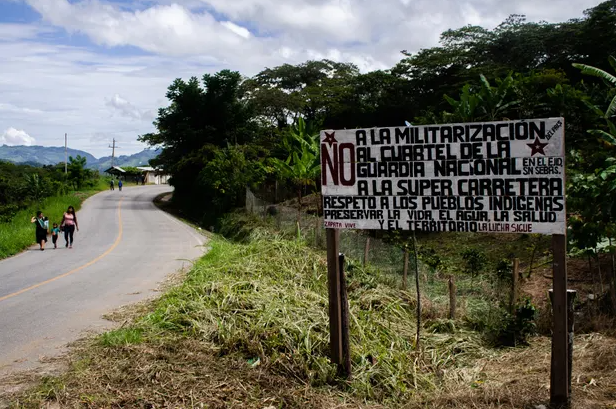
Photo: “No to militarization to the national guard barracks [and] to the super-highway. Respect for indigenous peoples. Preserve life, water, health and land. Zapata lives. The struggle continues.” Photo by Caitlin Cooper.
On October 4, The Guardian reported: “The national guard has built 165 barracks in Mexico since it was created only two years ago by President Andrés Manuel López Obrador… [The Indigenous Tzeltal ejido of San Sebastián Bachajón, Chiapas] is leading the first lawsuit against one of 500 or so barracks planned across the country.”
The article highlights that the community was not consulted about the base, nor did it give its free, prior and informed consent to it.
Ivette Galván, a lawyer with the Miguel Agustín Pro Juárez Human Rights Center (Centro Prodh), says: “This is the first [injunction] presented by an indigenous community against these barracks on the infringement of their collective rights.”
The Guardian article adds: “For the Tzeltal inhabitants of Chiapas, the barracks also raise concerns about their sovereignty in the face of development.”
“At stake in the region are at least 40 infrastructure projects, including the Mayan Train, a controversial plan for a 1,000-mile (1,600km) railway connecting Palenque in Chiapas with other tourist sites in the Yucatán peninsula, and a 400-mile highway connecting Pijijiapan with Palenque. The community in San Sebastián Bachajón [that launched the lawsuit against the barracks] is opposed to the highway project.”
Gustavo Castro, the founder of the local organization Otros Mundos Chiapas, says: “One of the greatest threats of militarization is the repression of social movements and protest, especially for a region with a long history of organization.”
Castro, who was with Indigenous Lenca defender Berta Cáceres when she was killed in March 2016, further notes that security forces have been also used to silence environmentalists to protect foreign investment in Nicaragua and Honduras.
The article also quotes Cata Hernández of the National Coordinating Committee of Indigenous Women (Conami) who says: “What we know is that in the past, the deployment of the military has had a negative impact, particularly for women and girls.”
The article continues: “The rape of three Tzeltal women at a military checkpoint in 1994 has gone unpunished.”
There are numerous other examples of sexual violence committed by the military against Indigenous women.
That includes Valentina Rosendo Cantú, an Indigenous Me’phaa woman who was sexually assaulted by soldiers on February 16, 2002. Her struggle has been accompanied by Sandra Alarcon and the Human Rights Centre of Montaña de Tlachinollan.
The Peace Brigades International-Mexico Project has relationships with Centro ProDH, Tlachinollan and at least seven organizations that oppose the Mayan Train megaproject including the Peoples’ Front in Defence of Land and Water.
PBI-Mexico has also linked the militarization of territory with the forced disappearance of three members of the Alvarado family in December 2009 after they were arbitrarily detained by the Mexican army in the state of Chihuahua. The case has been represented by several groups including the Paso del Norte Human Rights Centre.

